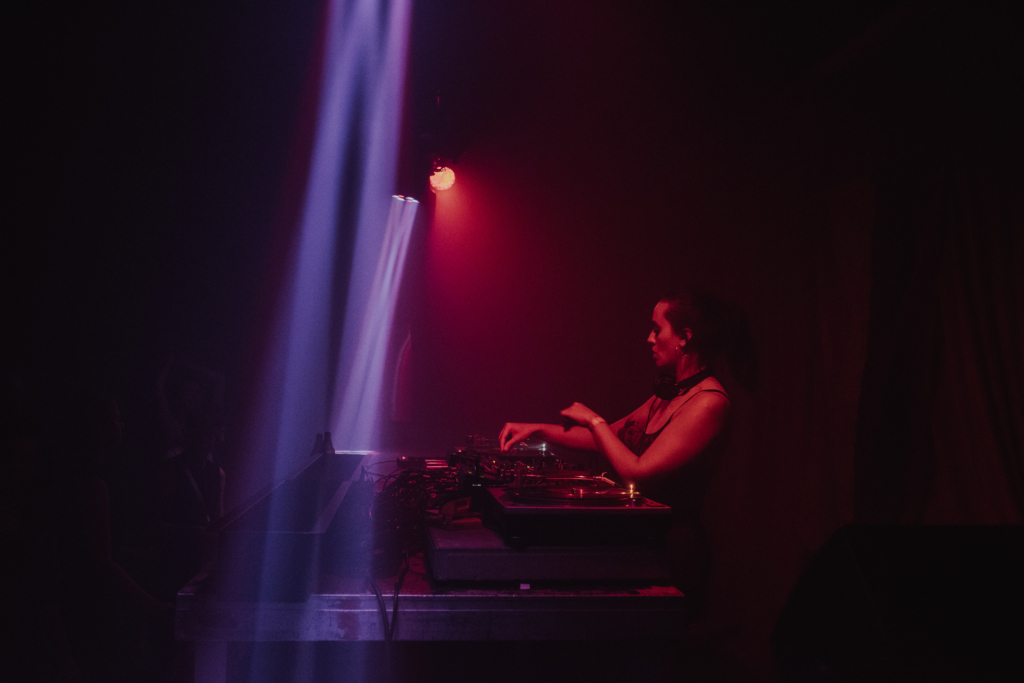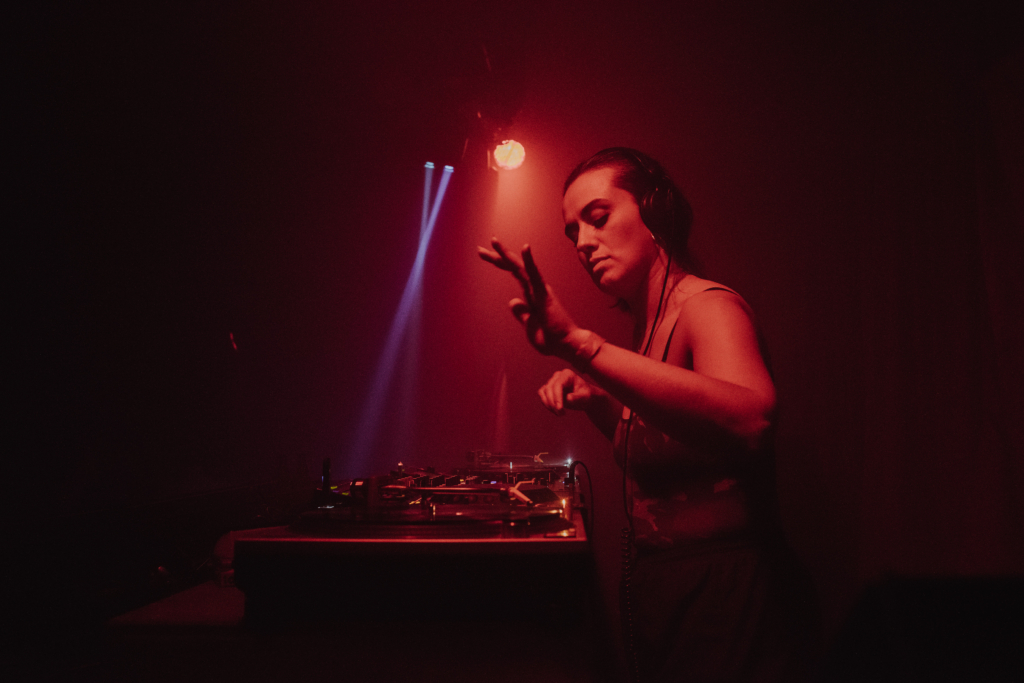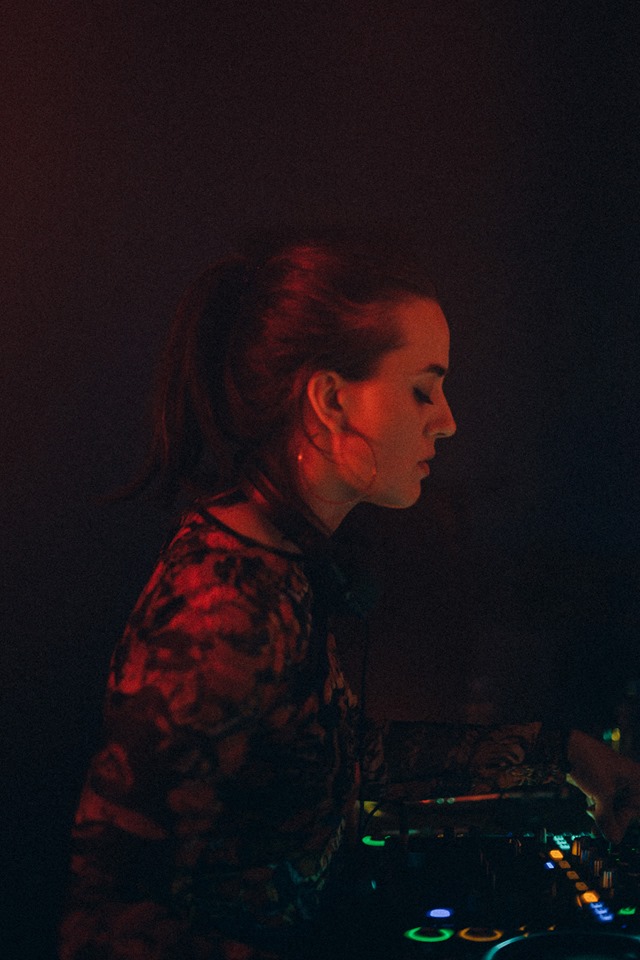Having kickstarted her DJing over a decade ago, Monster has become an integral figure in Poznan’s dance music scene. Cutting her teeth at the anarchist squat and social center Rozbrat, Monster then started throwing Squat The Electricity parties where she invited local DJs to play the squat. Unfortunately, the venue is now facing similar issues as other music institutions across the world, where land owners no longer take interest in dance music culture and look to sell the land to more profitable businesses.
Alongside her parties at Rozbrat, Monster leads DJing workshops at feminist events such as International Women’s Day fundraisers across the country and co-founded the collective LOW Kollektiv with Nioki and Spete. She’s also part of the Warsaw-based crew Oramics who aims to empower women, queer and non-binary people through showcases, workshops and releases where the profits go towards local charities – the recent one ‘TOTAL SOLIDARITY’ donated to grassroots LGBTQIA+ organisations in Poland.
Keeping the conversation going around Unsound, we caught up with Monster before her gig at the Polish festival two weeks ago to discuss the current circumstances in her city, the work she does within the two collectives and what solidarity means to her.
Starting from the very beginning, what was your first introduction to music and was there a specific moment that made you think this is what you wanted to pursue as your ‘career’?
My introduction to music had almost nothing to do with electronic music, but I do have vivid memories when it comes to first tracks and artists I would listen to. In the late ’80s and early ’90s, my mom traveled to Germany to work, those were the times when you couldn’t really watch MTV in Poland unless you had satellite TV. So my mother would record VHS tapes with her favorite music videos on German MTV and I clearly remember watching those three or four 180-minute-long tapes over and over again, rewinding to my favorite tracks and pretending I could sing in English, those were songs by Whitney Houston, Tina Turner, Billy Joel, R.E.M., Kim Wilde, Kylie Minogue, you get the idea. I feel like that kind of dancey late 80’s rhythm did form my musical taste and the love for cheesy melodies. My parents also sent me to music school but that was a complete disaster as I was the laziest student ever and my teacher hated me so then they decided to send me to English lessons and I guess that was a better choice because I work as an English teacher now. When it comes to electronic music, my introduction to it came pretty late. I was already at the university, started DJing that 80’s and 90’s pop at some small parties and got bored with it quite quickly. I somehow discovered Intergalactic FM and that’s how my current musical taste was formed. Realizing that music could be my career came really late in my life because most of the time I felt like I was DJing for fun, as I started working right after graduating from university so getting a stable income wasn’t a problem for me. But when I started recording promo mixes, winning some DJ competitions (one of them against over 100 DJs) and getting booked by people who I had never met before I thought “hmmm maybe I actually do know what I’m doing”.
Can you talk us through Rozbrat – the squat and social center you first started playing at – how did you discover it and what are the parties like there?
I became politically involved when I was still in high school and back then Rozbrat and its Anarchist Federation were one of the most active groups in Poland and I really wanted to participate in it, so when I finished school I decided to study in Poznan and get involved at Rozbrat, I was mainly engaged in political activities but after a while I also started DJing and, as I was part of the collective, it was easy for me to start organizing parties there. I actually first partied there and started clubbing later. Those were very interesting times because back in 2008/2009 there weren’t many places where you could DJ in Poznan so a lot of local DJs would agree to play at my parties for free (as no one makes money at Rozbrat) and they actually loved it. The space and the audience gave them total freedom and acceptance, they weren’t picky about good or bad transitions, they just wanted to release their energy through dance. You saw punks dancing on tables with clubbers on this tiny dancefloor for maybe 50 people with sweat dripping down the ceiling. It’s an illegally occupied social center run by the collective so there were no scary bouncers or the threat of cops raiding the party, just complete trust, and respect for one another.
What are the circumstances behind Rozbrat now facing eviction after running for 20 years?
Rozbrat was squatted in 1994, for about 20 years the owners of the largest piece of its land showed absolutely no interest in the area, unfortunately, they reappeared and are now trying to sell the land. The legal circumstances of this whole procedure are extremely complicated as they’re also connected to the wild privatization in Poland in the ’90s. Squatters’ rights are basically non-existent in the Polish law so right now Rozbrat has to organize a defense campaign and even though this was the birthplace of many workers’, tenants’ and human rights’ struggles in Poznan and has without a doubt shaped the social politics of the city, it is now left with zero support from local authorities.
You’re also involved with Oramics and LOW Kollektiv, how did the relationship begin with these two collectives and what do you hope to achieve within these?
I was one of the founders of LOW Kollektiv which I started with two other DJs in Poznan in 2017 after a long hiatus from DJing in clubs. I met those two people who wanted to DJ and we decided to start a DJ crew together, I can’t be grateful enough for how these two people brought be back from the dead (DJ-world-dead haha), we were extremely lucky to have played a lot of shows in a very short period of time and we earned a good reputation and evolved individually as DJs. One of them later left LOW Kollektiv and around the same time I joined Oramics and Spete (the person who stayed) joined another crew and although we’re still best friends, we’re extremely involved with our new projects so right now LOW has to wait haha.
I joined Oramics after I played at their party in Warsaw and recorded a mix for their podcast series, shortly after four more people joined and now there’s seven of us. Oramics has achieved so much over the two years of its existence that I’m actually scared to think about what happens next. As a collective aiming to empower women, queer and non-binary people we have been able to play at different festivals, organize many workshops, started having our own club nights in three Polish cities and recently released a charity VA compilation “Total Solidarity” supporting Polish LGBTQIA organizations. What we’ve always hoped to achieve was the international recognition of Polish/Eastern European artists and respectful treatment of minorities in the electronic music scene and it seems like we’ve made some steps forward but there’s still a long way to go, but at least now we know there are a lot of good people around us who are willing to help.


With most of your gigs in Poland at the moment, what is your favourite aspect of the scene?
The versatility, the freshness, the diversity, and the rapid development. I’ve been DJing for over ten years but what I’ve seen over the last two years has made me really hopeful about the future of the Polish electronic music scene. There are so many new crews all over Poland organizing amazing parties and festivals, releasing great music and, most importantly, NOT deciding to move to Berlin haha. Nobody here is bored, everyone can find something exciting for themselves and can find good companions to do things with.
You mentioned in a previous interview that the promoters in Poznań are beginning to take a more political stance and allowing conversation around safe spaces and organising events linked to demonstrations – why do you think the promoters have finally moved in that direction?
The current government of Poland made it easier for a lot of people to get pissed. It’s 2019 and we’re ruled by a bunch of homophobic, racist, fundamentalist Catholics, oh, let’s not forget they’re also climate change deniers, who are blaming the LGBTQIA community for all the evil in the world and are trying to put women who get an abortion in jail. Poznan has always been quite a liberal city, so a lot of young people living here have had enough of this disgusting rhetoric and aren’t afraid of being political and more welcoming to minorities. I think clubs and promoters have finally seen that this scene is supposed to be inclusive, tolerant and open and it’s too late to be quiet about what’s going on around us.
There’s also the discussion around the economy and how clubs can only really afford to book local talent, which you’re seeing the positive effects of. Who are some of your favourite artists in Poland at the moment?
I love and hate this question. Love because there are so many people who deserve recognition and hate because there are TOO MANY of them! The whole Oramics crew is a goldmine! FOQL, ISNT, dogheadsurigeri, Mala Herba, Olivia and Avtomat – all different, all so talented and unique and special. The scene in Poznań is also amazing, with DJs like MRTN., Feelaz, Impakt, Zariush, Alegria who have been shaping the local scene for a long time and some newcomers like my BFF Spete, Cosmaya and my trance brothers Matelsky and Aerniax. Earth Trax is probably the best house DJ in Poland, Jaxe and Seltron400 have released some of the best EPs this year, there’s also the amazing T A K A, my favorite Polish live act performer who happens to be from my hometown, Dtekk is basically a living legend, so is Rrrkrta from Brutaż. I love the Krakow electro duo Vield and the Polish trance king Shatterkunst, also from Krakow. I’m also really happy about the international success of VTSS, Olivia, Blazej Malinowski, and Sept because that means Polish artists are not invisible anymore.
It feels like the world could learn from Poland by booking more local artists as it will lessen the environmental impact of the industry – what have you found to be some of the pros and cons of clubs running in this way?
The biggest con of this situation is that we can’t really book more than one international headliner for one club event, their agents are usually unwilling to understand the economic reality in Poland, that we really can’t charge more than 5-7 euros at the door because people can’t afford to pay more. And international headliners bring more people to parties, so we have to find different ways to attract bigger crowds. For instance, promoting local DJs more, which is the biggest pro. It’s really heartwarming to see some local DJ crews being able to systematically bring large audiences to their events, even though there isn’t a huge international name on the bill. The local audience has a lot of trust in the talent of Polish artists and finally, after many years big festivals don’t schedule Polish performers only as warmup acts at their events, they are often the highlights of the night.
The theme of Unsound this year was Solidarity – what does that word mean to you? Do you have any personal connections to it?
Solidarity is a very important word for me, although it has lost its power in Poland because of what Solidarność trade union has become, it is currently a pro-government scab trade union and has completely embarrassed their legacy.
However, solidarity has always meant a lot to me, especially in the past when I was involved in prisoner support, that was definitely the most interesting part of my activism. People often forget about showing solidarity to everyone, including those behind bars, and we often forget that most of them ended up in jail because of unfavorable living conditions, no access to good education and economic discrimination. Solidarity is giving up a little bit of your comfort to make someone in a worse situation feel better, feel like they’re not alone. We’re living in times of extreme alienation and remembering about empathy, compassion and solidarity should be our priority, for our own good.
Find more information on Unsound here and follow Monster here.
